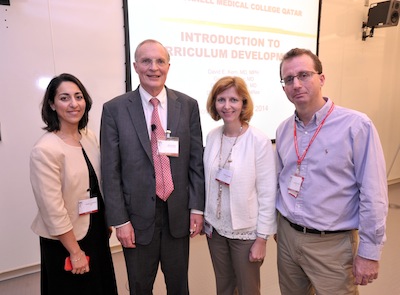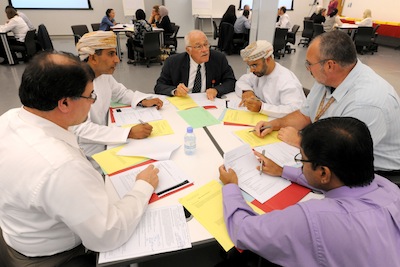WCMC-Q shares curriculum development know-how with the healthcare community
December, 2014

(L-R) Ms. Deema Al-Sheikhly, Dr. David E. Kern, Dr. Dora Stadler
and Dr. Gerardo Guiter.
Faculty and healthcare professionals from across the region convened at WCMC-Q to explore systematic approaches to curriculum development in the field of professional health education during the fourth Educators Across the Health Care Spectrum series.
The two-day event, developed and coordinated by WCMC-Q’s Division of Continuing Professional Development and attended by more than 200 healthcare professionals, began with a lecture by Dr. David E. Kern, emeritus professor of medicine at the Johns Hopkins University School of Medicine. Dr. Kern presented a logical six-step approach that academics can follow to develop professional health education curricula that deliver the best possible learning outcomes.
Dr. Kern, who has a long and distinguished track record as a pioneer in the advancement of medical education and faculty development, is well known in the healthcare community for his instrumental role in the establishment of the Johns Hopkins General Internal Medicine Residency Program, the Johns Hopkins Faculty Development Program for Clinician-Educators and the Osler Center for Clinical Excellence at Johns Hopkins, among many other significant achievements in the field.
Addressing an audience comprised of healthcare professionals from WCMC-Q, local institutions, and from further afield, such as the Oman Medical Specialty Board, Dr. Kern said: “Curriculum development is an extremely important discipline because medical educators hold positions of public trust and therefore have a professional and ethical obligation to meet the needs of their learners, patients and society. By taking a logical and systematic approach to curriculum development we can achieve these goals.”

The lecture was followed by an intensive workshop.
The lecture was followed by a comprehensive three and a half-hour workshop introducing the theories underpinning systematic approaches to curricula development, from problem identification, needs assessment, and setting of goals and objectives, to implementation and feedback. The second day of the event featured a roundtable discussion of curriculum development among faculty, a lecture on curriculum development as a path to scholarship and publication, and a second workshop. The workshops were facilitated by Dr. Dora Stadler, Dr. Gerardo Guiter and Ms. Deema Al-Sheikhly from WCMC-Q.
Explaining the aims of the event, Deema Al Sheikhly, WCMC-Q’s continuing professional development manager, said: “Faculty are often required to design and implement educational experiences, which can be quite a formidable task, especially since there are frequently limiting factors such as time pressure, heavy workload and institutional budgetary constraints, plus the fact that they may have received no formal training in curriculum planning.
“This event introduced faculty to a systematic six-step method that will allow them to develop and deliver effective learning experiences in an efficient and reliable way, in addition to equipping them with the skills and knowledge to revise curricula over time in order to stay up-to-date with the latest innovations in healthcare provision and education.”
Dr. Dora Stadler, assistant dean for continuing professional development, added: “The workshops provided a great opportunity for educators from a variety of healthcare settings to start developing or revising their curricular plans, with real time feedback from an international expert. Everyone left the workshops energized and able to apply the principles of systematic curricular development to continue the work they have begun.”
